The true random number generator TRNG market is estimated to be valued at USD 3.7 billion in 2025 and is projected to reach USD 13.2 billion by 2035, registering a compound annual growth rate (CAGR) of 13.4% over the forecast period.
This growth can be attributed to the rising demand for high-security applications across industries like cryptography, blockchain, and secure data transmission. As organizations increasingly prioritize the protection of sensitive information, TRNGs, which provide enhanced unpredictability compared to traditional pseudorandom methods, have become essential for securing communication networks and online transactions. The adoption of these advanced security solutions is expected to intensify as digital platforms and cybersecurity threats evolve. The market's growth is further supported by the expanding adoption of TRNG technology in embedded systems, government applications, and IoT devices, where high levels of security are critical.
Key sectors such as banking, finance, and healthcare are increasingly integrating TRNG solutions to safeguard digital assets and sensitive data. Over the next five years, as the digital transformation accelerates across various industries, demand for TRNGs will see sustained growth. The continual refinement of cryptographic protocols and the ongoing drive for fortified encryption methods are expected to drive an increasing share of market investments towards TRNG-based security systems.
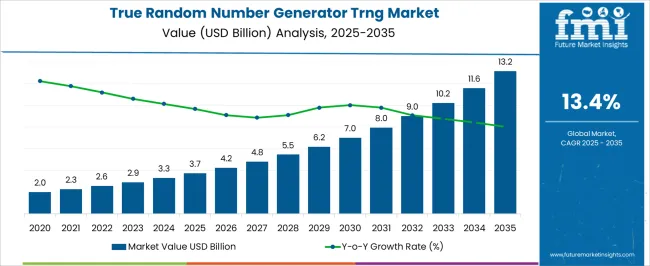
| Metric | Value |
|---|---|
| True Random Number Generator TRNG Market Estimated Value in (2025 E) | USD 3.7 billion |
| True Random Number Generator TRNG Market Forecast Value in (2035 F) | USD 13.2 billion |
| Forecast CAGR (2025 to 2035) | 13.4% |
The True Random Number Generator (TRNG) market holds a specialized but significant share across several parent markets. Within the cryptography market, TRNGs contribute around 3-4% of the total market share, primarily driven by their role in generating secure keys for encryption, a critical requirement in secure communications and data protection. In the semiconductor market, TRNGs account for about 2-3%, as they are integral in various hardware applications, including the production of secure chips for consumer electronics, IoT devices, and embedded systems. Within the broader cybersecurity market, TRNGs hold an estimated share of 4-5%, given their essential function in enhancing encryption algorithms, thus ensuring secure online transactions and sensitive data protection.
In the data encryption market, TRNGs represent roughly 3-4%, as they are heavily relied upon to generate encryption keys for securing data across industries. In the cloud computing market, TRNGs make up around 2-3% of the market share, as cloud service providers increasingly adopt them to bolster security in cloud-based services, ensuring safe data transfer and access. These percentages reflect the growing demand for high-quality random number generation to meet the security needs of emerging technologies across sectors like finance, defense, and healthcare.
The market is experiencing strong momentum as demand for high-security cryptographic systems and data protection continues to escalate across multiple industries. The increasing sophistication of cyber threats, combined with expanding regulatory compliance requirements, is driving the adoption of TRNG solutions that generate unpredictable and non-reproducible values for secure encryption.
The technology’s reliance on physical entropy sources rather than algorithmic sequences has positioned it as a critical component in safeguarding sensitive transactions, communications, and authentication processes. Advancements in semiconductor design, integration with secure microcontrollers, and expansion into quantum-based generation methods are further enhancing the performance and reliability of TRNG devices.
Future growth prospects are reinforced by the proliferation of connected devices, blockchain applications, and high-assurance security architectures in sectors such as finance, defense, and telecommunications As the digital economy expands and threats become more complex, TRNG systems are expected to remain a foundational element of next-generation security frameworks, ensuring long-term adoption and market resilience.
The true random number generator TRNG market is segmented by solution, application, end use industry, and geographic regions. By solution, true random number generator TRNG market is divided into hardware and software. In terms of application, true random number generator TRNG market is classified into cryptography & encryption, gambling & lotteries, scientific research & simulation, cybersecurity & authentication, and IoT & edge devices. Based on end use industry, true random number generator TRNG market is segmented into BFSI, defense & government, gaming & entertainment, healthcare, IT & telecom, automotive, and others. Regionally, the true random number generator TRNG industry is classified into North America, Latin America, Western Europe, Eastern Europe, Balkan & Baltic Countries, Russia & Belarus, Central Asia, East Asia, South Asia & Pacific, and the Middle East & Africa.
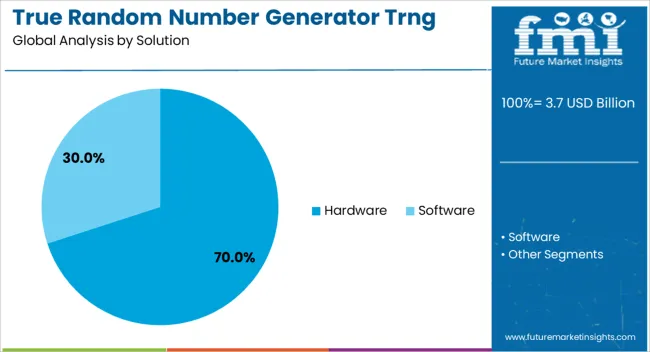
The hardware solution segment is projected to hold 70% of the market revenue share in 2025, making it the dominant offering type. This leadership position has been driven by the superior security attributes of hardware-based TRNGs, which utilize physical entropy sources such as electronic noise or quantum phenomena to produce truly random outputs. Hardware devices are preferred in high-assurance environments where software-based pseudo-random methods may be vulnerable to predictive attacks.
Their integration into secure chips, cryptographic modules, and embedded systems has expanded adoption in critical applications. The segment’s growth is further supported by advancements in miniaturization, low-power design, and compatibility with a range of computing architectures.
As industries prioritize tamper resistance and compliance with stringent security certifications, hardware TRNGs have become essential for applications demanding uncompromising randomness quality The ability to deliver high-speed, unpredictable random values directly from a dedicated hardware source continues to reinforce the segment’s leading market position.
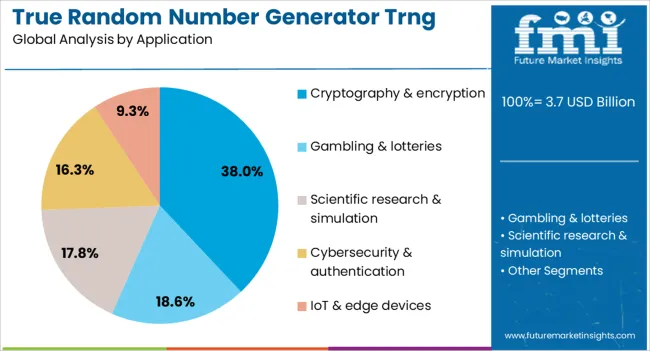
The cryptography and encryption application segment is anticipated to command 38% of the market revenue share in 2025, emerging as the largest application area. This dominance has been fueled by the critical role TRNGs play in generating secure keys, digital signatures, and authentication codes that underpin modern encryption systems. The unpredictable outputs of TRNGs enhance the resilience of cryptographic protocols against brute force and statistical attacks.
Increasing adoption in secure communications, financial transactions, and digital identity verification has further accelerated the use of TRNG-enabled encryption solutions. Advancements in hardware-accelerated encryption and integration with secure processors have allowed for seamless deployment across a broad spectrum of devices and networks.
The rise of quantum computing threats has also heightened the need for robust random number generation in cryptographic systems This enduring reliance on TRNGs for maintaining the integrity and confidentiality of sensitive data continues to secure the segment’s leadership in the market.
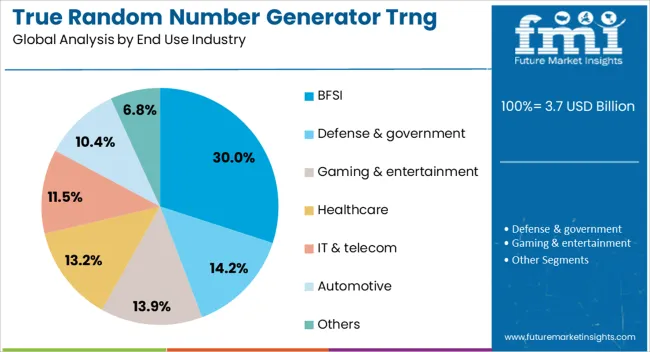
The BFSI end-use industry segment is expected to account for 30% of the market revenue share in 2025, establishing it as the leading industry vertical. The segment’s prominence has been shaped by the growing importance of uncompromising security in banking, financial services, and insurance operations. TRNGs are extensively deployed to safeguard online transactions, secure customer data, and comply with stringent regulatory frameworks governing cybersecurity in the financial sector.
The integration of hardware-based TRNGs into payment systems, ATM networks, and secure authentication platforms has enhanced protection against fraud and data breaches. Expanding digital banking services, mobile payments, and blockchain-based financial products have further amplified demand for high-quality random number generation.
As cyber risks evolve, BFSI institutions are prioritizing cryptographic resilience and secure key management, both of which are strengthened by TRNG technology This sustained emphasis on trust, compliance, and transaction integrity continues to anchor the BFSI segment’s leading position in the market.
The true random number generator market is expanding, driven by the increasing need for secure encryption in industries such as finance, defense, and telecommunications. Emerging markets present new growth opportunities, as digital security concerns rise across developing economies. However, the market faces challenges in terms of cost, integration complexity, and ensuring high randomness in outputs. The adoption of TRNG systems is poised to rise as industries embrace enhanced security measures, ensuring the protection of sensitive data in an increasingly interconnected world.
The demand for true random number generators (TRNG) is growing across industries requiring high-level data security and cryptographic applications. As cyber threats continue to evolve, secure encryption methods using TRNG are becoming essential for ensuring confidentiality and integrity in digital transactions, communications, and financial applications. Industries such as banking, defense, and e-commerce are driving this demand, as the need to safeguard sensitive information intensifies. This demand is expected to further rise with the increasing adoption of blockchain technology and cryptographic security solutions that rely on high-quality random number generation.
The true random number generator market holds significant opportunities in emerging regions, where digital transformation is gaining momentum. Governments and industries in developing countries are investing heavily in cybersecurity to protect growing online infrastructure. This creates a rising demand for reliable and efficient TRNG systems, particularly in sectors like telecommunications, finance, and defense. Furthermore, the increasing adoption of cloud computing services and the expansion of IoT systems are expected to further contribute to the market growth, as these technologies require secure and efficient random number generation for data protection.
Integration of TRNG systems into various sectors is becoming more prevalent, especially as industries look for reliable solutions for data protection and encryption. Key sectors such as telecommunications and IoT are witnessing increased use of hardware-based TRNG for creating secure encryption keys and ensuring robust data transmission. Moreover, advancements in quantum-safe cryptography are leading to an upsurge in demand for TRNG systems capable of generating highly secure random numbers resistant to future quantum computing threats. This trend points to a future of enhanced security, where TRNG plays a vital role in safeguarding critical digital infrastructure.
Despite the growth prospects, the TRNG market faces certain challenges related to cost and complexity. Hardware-based solutions are often more expensive than their pseudo-random counterparts, which may deter smaller organizations or budget-constrained sectors from adopting TRNG. Furthermore, the integration of TRNG into existing systems requires technical expertise and resources, limiting its application in some industries. Additionally, ensuring high levels of randomness and avoiding predictable patterns in TRNG outputs remains a concern, especially as the need for absolute security intensifies with increasing cyber threats.
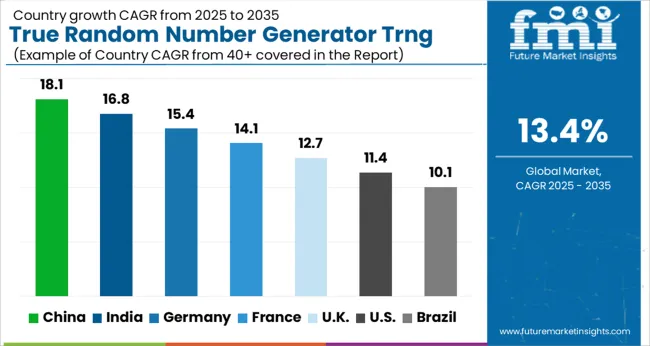
| Country | CAGR |
|---|---|
| China | 18.1% |
| India | 16.8% |
| Germany | 15.4% |
| France | 14.1% |
| UK | 12.7% |
| USA | 11.4% |
| Brazil | 10.1% |
The global True Random Number Generator (TRNG) market is projected to grow at a CAGR of 13.4% from 2025 to 2035. China leads with a growth rate of 18.1%, followed by India at 16.8%, and France at 14.1%. The United Kingdom records a growth rate of 12.7%, while the United States shows the slowest growth at 11.4%. This growth is primarily driven by increasing demand for secure encryption systems, advancements in quantum computing, and growing applications across industries such as cybersecurity, gaming, and financial services. Emerging markets like China and India are experiencing higher growth due to rapid technological advancements, whereas mature markets like the USA and the UK exhibit steady growth, driven by the increasing focus on data security and privacy. This report includes insights on 40+ countries; the top markets are shown here for reference.
The TRNG market in China is projected to grow at a CAGR of 18.1%. China’s rapid advancements in technology, especially in the fields of cybersecurity and encryption, are driving the demand for secure random number generation systems. The country’s focus on building secure digital infrastructure, along with increasing investments in artificial intelligence (AI) and quantum computing, has accelerated the need for TRNG systems. Additionally, the growing adoption of TRNG in blockchain technology for enhanced security is further contributing to market expansion in China.
The TRNG market in India is expected to grow at a CAGR of 16.8%. India’s increasing focus on improving data security across industries is significantly contributing to the market’s growth. The government’s push for digitalization in sectors such as banking, e-commerce, and telecommunications has heightened the demand for secure encryption technologies, including TRNG systems. Additionally, the growing popularity of digital transactions and the rise in cybersecurity threats have further accelerated the adoption of secure random number generators, making India a key player in the global market.
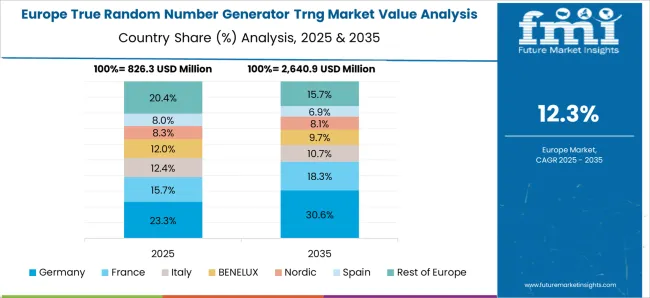
The TRNG market in France is projected to grow at a CAGR of 14.1%. France’s emphasis on strengthening its cybersecurity infrastructure, coupled with the increasing need for secure encryption solutions across sectors like finance, telecommunications, and healthcare, continues to drive the demand for TRNG systems. The country’s focus on adopting cutting-edge technologies, including AI and quantum computing, further accelerates the growth of the TRNG market. France’s growing regulatory frameworks on data privacy and the adoption of secure random number generation for compliance purposes also play a significant role in market expansion.
The TRNG market in the United Kingdom is expected to grow at a CAGR of 12.7%. The UK’s focus on enhancing data security and implementing stringent data privacy regulations is contributing to the increased adoption of secure encryption systems like TRNG. The growing demand for secure digital communication in sectors such as finance, government, and healthcare further drives market growth. Additionally, advancements in blockchain technologies and their integration with TRNG systems for enhanced security are gaining traction in the UK, adding to the market’s expansion.
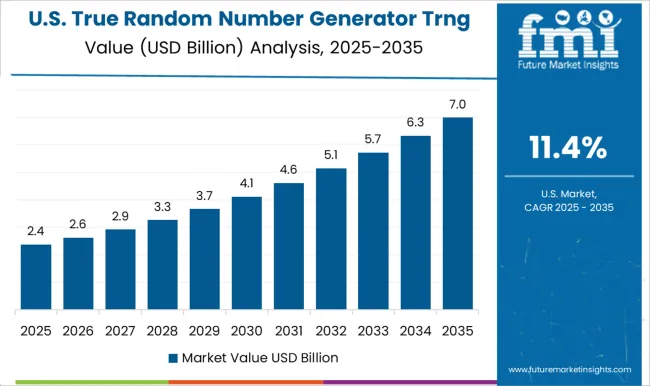
The TRNG market in the United States is projected to grow at a CAGR of 11.4%. The USA continues to be a leader in the cybersecurity industry, with an increasing emphasis on protecting sensitive data across sectors like finance, healthcare, and government. The growing adoption of TRNG systems for cryptographic applications and secure communications further drives market growth. Additionally, the rise in digital transformation and the increasing need for quantum-safe encryption technologies are contributing to the expansion of the TRNG market in the USA, as the demand for high-security solutions continues to grow.
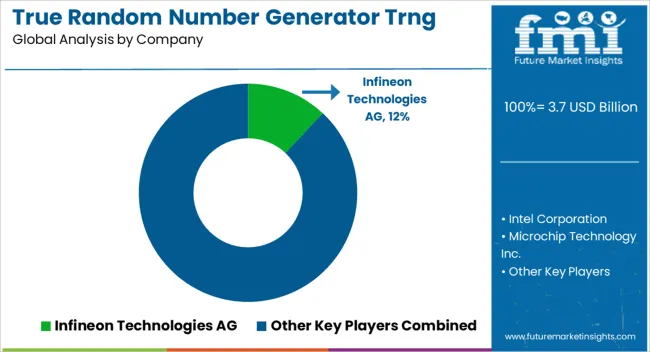
The true random number generator (TRNG) market is highly competitive, with major players such as Infineon Technologies AG, Intel Corporation, Microchip Technology Inc., NXP Semiconductors N.V., ID Quantique SA, Qualcomm Incorporated, STMicroelectronics N.V., and Apple Inc. leading the charge in the development and innovation of TRNG solutions. Infineon Technologies AG is at the forefront, offering a range of TRNG products that cater to the growing need for secure data encryption and cryptographic applications. Intel Corporation and Microchip Technology Inc. also provide cutting-edge TRNG solutions, with a focus on high-speed, low-latency performance, which is crucial for sectors like cybersecurity, telecommunications, and IoT. NXP Semiconductors N.V. and ID Quantique SA are gaining traction through their expertise in quantum cryptography, offering TRNG solutions that leverage the randomness of quantum mechanical phenomena. These solutions are expected to play a critical role in enhancing data security in emerging technologies like blockchain.
Qualcomm Incorporated, STMicroelectronics N.V., and Apple Inc. focus on integrating TRNG technology into their broader product offerings, from mobile devices to automotive systems, addressing the growing demand for secure random number generation in various applications. The competitive landscape is shaped by continued advancements in semiconductor technology, strategic collaborations, and the increasing need for robust security solutions across multiple industries, positioning these key players as leaders in the TRNG market.
| Item | Value |
|---|---|
| Quantitative Units | USD 3.7 Billion |
| Solution | Hardware and Software |
| Application | Cryptography & encryption, Gambling & lotteries, Scientific research & simulation, Cybersecurity & authentication, and IoT & edge devices |
| End Use Industry | BFSI, Defense & government, Gaming & entertainment, Healthcare, IT & telecom, Automotive, and Others |
| Regions Covered | North America, Europe, Asia-Pacific, Latin America, Middle East & Africa |
| Country Covered | United States, Canada, Germany, France, United Kingdom, China, Japan, India, Brazil, South Africa |
| Key Companies Profiled | Infineon Technologies AG, Intel Corporation, Microchip Technology Inc., NXP Semiconductors N.V., ID Quantique SA, Qualcomm Incorporated, STMicroelectronics N.V., Apple Inc., and Others |
| Additional Attributes | Dollar sales by product type (hardware-based, software-based), dollar sales by form (integrated circuits, modules, software), trends in encryption and security applications, use in IoT devices and cryptographic systems, growth in demand for high-performance computing and secure communications, and regional patterns of TRNG adoption in technology sectors. |
The global true random number generator TRNG market is estimated to be valued at USD 3.7 billion in 2025.
The market size for the true random number generator TRNG market is projected to reach USD 13.2 billion by 2035.
The true random number generator TRNG market is expected to grow at a 13.4% CAGR between 2025 and 2035.
The key product types in true random number generator TRNG market are hardware and software.
In terms of application, cryptography & encryption segment to command 38.0% share in the true random number generator TRNG market in 2025.
Explore Similar Insights

Thank you!
You will receive an email from our Business Development Manager. Please be sure to check your SPAM/JUNK folder too.